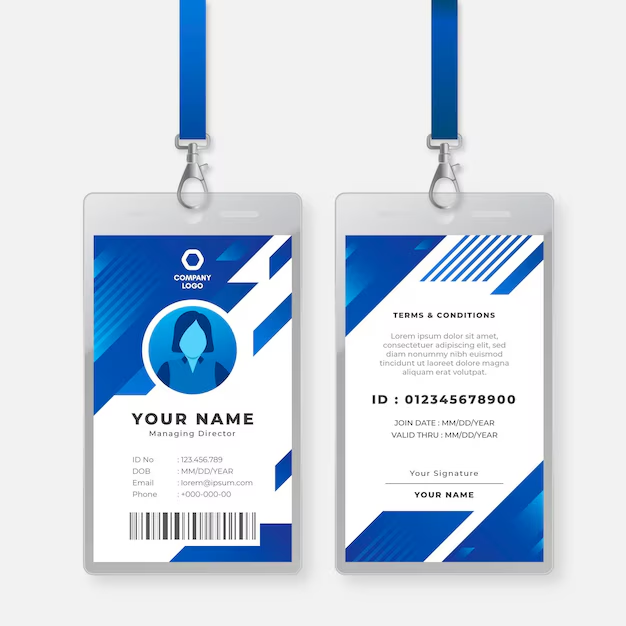Id Cards

A Weight ID Card is a personalized identification card that displays an individual’s weight information and other relevant health or fitness data. It is often used by athletes, fitness enthusiasts, healthcare professionals, or individuals who are focused on weight management and overall well-being. The Weight ID Card serves as a practical tool for tracking progress, making it easier for users to monitor changes in their weight and maintain a consistent health routine.
What is a ID Card?
A Weight ID Card is a compact, portable card that contains essential personal weight-related information, often including the person’s current weight, target weight, body mass index (BMI), and other related health data. It is typically used by individuals in various health and fitness programs, such as weight loss, bodybuilding, or weight maintenance. The card helps individuals track their weight over time and serves as a quick reference to monitor their progress
Key Features of a ID Card
Personalized Information: The card contains the individual’s weight, height, target weight, BMI, and possibly body fat percentage. Some cards also include details like medical conditions, allergies, or fitness goals for personalized care.
Compact and Portable: Designed to be small and easy to carry, the card can be kept in a wallet, purse, or gym bag, making it easily accessible when needed.
Updated Weight Records: Regular updates allow the card to reflect the user’s most recent measurements, helping them track weight changes over time.
Health and Fitness Goals: The Weight ID Card may include specific goals such as target weight loss, muscle gain, or fitness milestones, motivating users to stay on track.
How the ID Card Works
The Weight ID Card is typically issued by a health organization, fitness center, or healthcare provider. When you sign up for a weight management program, or health monitoring service, your weight data is recorded. The card is then created, displaying your current weight and other related information, such as target weight and BMI. Regular visits to the facility, such as a gym or clinic, will update your card with the latest weight readings and progress.
Many Weight ID Cards can be linked to mobile apps or online tracking platforms, allowing users to sync their data for more detailed progress tracking, reports, and feedback.
Benefits of a ID Card
Motivation for Weight Goals: The Weight ID Card helps individuals stay focused on their fitness or health goals by providing a tangible reference to track their progress over time.
Convenient Health Tracking: The card acts as a quick reference for individuals who are actively managing their weight, offering easy access to current data, target goals, and updates.
Accountability: Regular updates on the card ensure that users are consistently monitoring their weight, which encourages a higher level of accountability and consistency in achieving their health and fitness objectives.
Portable and Accessible: The compact size makes it easy to carry around, allowing for quick check-ins and progress assessments during visits to health professionals, fitness centers, or when attending personal training sessions.
Limitations of a ID Card
Limited Data: A Weight ID Card typically provides only basic weight and health information, meaning it doesn’t offer comprehensive health metrics such as blood pressure or cholesterol levels.
Potential for Overemphasis on Weight: Focusing primarily on weight may ignore other important aspects of health, such as muscle mass or overall fitness levels, potentially leading to unhealthy obsessions with weight numbers.
Requires Regular Updates: For the card to be useful, it needs to be updated frequently with accurate measurements, which can be inconvenient for individuals who don’t have access to regular health checks.
Innovations and Future of ID Cards
Integration with Digital Platforms: As technology advances, future Weight ID Cards may be linked to mobile apps, allowing users to view detailed health reports, track progress, and set goals directly from their smartphones.
Smart Weight Cards: Innovations like NFC-enabled or RFID-based weight ID cards could allow users to easily scan their card at fitness centers or clinics to update and track their data automatically.
Personalized Health Insights: With advancements in data analytics and AI, future cards could include personalized health insights, predictive analysis for achieving weight goals, and customized fitness recommendations based on the user’s data
Conclusion
The Weight ID Card is a practical and efficient tool for individuals looking to track their weight and health progress. With its compact design and personalized information, it offers a convenient way to stay accountable to fitness goals, whether for weight loss, muscle gain, or maintaining a healthy lifestyle. As technology continues to evolve, the Weight ID Card may integrate with digital tools, providing even more features to assist individuals in their health and wellness journeys

